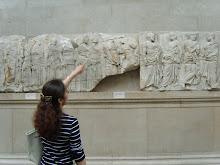Writing as a Reader on the Given Column
(The given column is by John Huer in The Korea Times, Saturday/Sunday, August 8-9, 2009.)
----------------------------------------------------------------------------
Dear Mr. Huer,
I read your column, “What Are the Ten Greatest Evils of Our Time?” Regarding the two evils you commented—2 and 4, i.e. Entertainment and Freedom—, let me articulate my impression.
Some issues you proposed evoke ambivalent perspectives both agreeable and sceptical. I wonder if it is because of your stance which sometimes seems radical, and sometimes conservative. It seems to me that a general issue you have discussed is prone to be specified, or narrowed into materiality/phenomenality. For example, the ‘Entertainment’ you remarked seems related only to TV shows operated by remote control. I’m afraid you specified one type of entertainment, in a sense typical one way. Apart from TV shows, there are many sorts of entertainment in the world, such as spectator sports.
I’ll restrict myself within your boundary. I generally agree that entertainment makes people stupid and slavish with juggling. It drives its audience to be thoughtlessly snobbish imitators. In a certain point of view, the dominant power often promotes entertainment over the dominated, because they don’t want their power to be challenged. Thoughtless people are easily cheated and controlled by despotic government. We could find one example in the 5th government in Korea, one of the viciously dictatorial governments, which had extraordinarily encouraged sports and media entertainments. They hated to be criticised as mass-murdering-citizen military government, but it was true, they took the power through the 5.18 Kwangju Massacre. Was it not so?
I’m sorry to say this that I think the freedom section in your column is somewhat confused. For instance, I hold, in a strict sense, the Americans in 1776 had fought for liberty, not for freedom. Their referring to it as liberty is definitely right, I think. Liberty and freedom are similar, but delicately different from each other, as we know. While liberty is closer to autonomy or independence, freedom more inclined to individuality and at times physicality—so to speak, one is able to act freely according to his/her own will—, even though the two often relate to the same meaning. I argue that the Americans gained liberty from the British, but plundered freedom and liberty from the aborigine simultaneously. That’s another story. Anyway, my understanding, the freedom you meant is approaching to self-indulgence or arbitrariness. If so, I agree it is quite evil.
From a point of view, we can say that the evils you selected are also the virtues as far as well-practised or controlled. When initiated in human history, they were all the highest values. Of course, it is difficult to maintain the middle-of-the-road, and moderation is the prime question in all spheres of society, from politics to individual lives.
Please excuse me if I appear rude! Maybe I didn’t fully understand your argument. I must say that I enjoyed reading your column. Thank you.
Sincerely,
Britannia (19th August, 2009)
(The given column is by John Huer in The Korea Times, Saturday/Sunday, August 8-9, 2009.)
----------------------------------------------------------------------------
Dear Mr. Huer,
I read your column, “What Are the Ten Greatest Evils of Our Time?” Regarding the two evils you commented—2 and 4, i.e. Entertainment and Freedom—, let me articulate my impression.
Some issues you proposed evoke ambivalent perspectives both agreeable and sceptical. I wonder if it is because of your stance which sometimes seems radical, and sometimes conservative. It seems to me that a general issue you have discussed is prone to be specified, or narrowed into materiality/phenomenality. For example, the ‘Entertainment’ you remarked seems related only to TV shows operated by remote control. I’m afraid you specified one type of entertainment, in a sense typical one way. Apart from TV shows, there are many sorts of entertainment in the world, such as spectator sports.
I’ll restrict myself within your boundary. I generally agree that entertainment makes people stupid and slavish with juggling. It drives its audience to be thoughtlessly snobbish imitators. In a certain point of view, the dominant power often promotes entertainment over the dominated, because they don’t want their power to be challenged. Thoughtless people are easily cheated and controlled by despotic government. We could find one example in the 5th government in Korea, one of the viciously dictatorial governments, which had extraordinarily encouraged sports and media entertainments. They hated to be criticised as mass-murdering-citizen military government, but it was true, they took the power through the 5.18 Kwangju Massacre. Was it not so?
I’m sorry to say this that I think the freedom section in your column is somewhat confused. For instance, I hold, in a strict sense, the Americans in 1776 had fought for liberty, not for freedom. Their referring to it as liberty is definitely right, I think. Liberty and freedom are similar, but delicately different from each other, as we know. While liberty is closer to autonomy or independence, freedom more inclined to individuality and at times physicality—so to speak, one is able to act freely according to his/her own will—, even though the two often relate to the same meaning. I argue that the Americans gained liberty from the British, but plundered freedom and liberty from the aborigine simultaneously. That’s another story. Anyway, my understanding, the freedom you meant is approaching to self-indulgence or arbitrariness. If so, I agree it is quite evil.
From a point of view, we can say that the evils you selected are also the virtues as far as well-practised or controlled. When initiated in human history, they were all the highest values. Of course, it is difficult to maintain the middle-of-the-road, and moderation is the prime question in all spheres of society, from politics to individual lives.
Please excuse me if I appear rude! Maybe I didn’t fully understand your argument. I must say that I enjoyed reading your column. Thank you.
Sincerely,
Britannia (19th August, 2009)


No comments:
Post a Comment